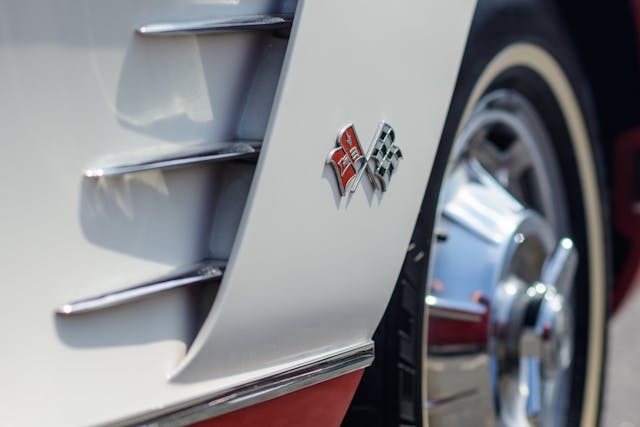Corvette returned to Kansas owner after 6-year VIN debacle
The smallest details can make or break a restoration. Sometimes in very interesting and frustrating ways, as Richard Martinez has learned over the last six years. That is how long it took for the seizure, ensuing court battle, and, finally, the return of his 1959 Chevrolet Corvette.
All this, over two rivets.
The fasteners in question held the VIN plate to the car and only caused all this ruckus because of a Kansas law intended to curb VIN-swapping of stolen or otherwise questionable cars. During an earlier restoration of the Vette—critically, one that occurred before Martinez bought it—someone replaced the two round-head Phillips screws that originally secured the VIN plate with a pair of pop rivets. Only when Martinez registered his 1959 Corvette was the discrepancy called out, an action which triggered the seizure of the car by the Kansas Highway Patrol. The car remained in impound, despite no evidence that it was stolen or otherwise tampered with. The FBI even decided in favor of Martinez—to no avail.
As a seized asset, the classic Chevrolet languished outside in an impound lot while a legal battle raged. The case was elevated all the way to the Kansas state legislature, who ultimately sent House Bill 2594 to governor Lauren Kelly’s desk. She signed the bill into law on March 22 of this year. It went into effect nine days later, laying the path for the Corvette to be returned to Martinez. He had sustained a significant financial loss: Martinez spent an estimated $30,000 in legal fees to reclaim a car he bought for $50,000, according to Martinez. It would be easy to be frustrated with the Highway Patrol, but according to KCTV 5 in Kansas City, the thought never crossed Martinez’ mind. The law was clear and enforcement fair; the law simply needed reform.
The return of his Corvette should feel like a victory, but Martinez is clear that this journey has been financially and emotionally draining. The car and $20,000 have been awarded to Martinez, but reports cite that there could be as much as $28,000 in damage to the vehicle. $20,000 is the cap that can be awarded by Kansas to Martinez for repairs, which the Corvette desperately needs, after sitting outside for six years. As of this writing, it does not start.
This is not the outcome anyone would have predicted, and it also falls somewhere in between good and bad on the scale of results we would have wished for. Regardless, we applaud Martinez for sticking with the case, and Kansas lawmakers for acknowledging the law needed an update that allowed for vintage vehicles undergoing a restoration that might require the tag to be removed—and honestly replaced. Good on the state for following through to make sure another owner won’t have their car improperly seized.
Check out the Hagerty Media homepage so you don’t miss a single story, or better yet, bookmark us.



There is a court recognized legal basis for the owner to sue the state for failure to protect his property until he is given legal notice he no longer owns the vehicle This legal basis is known as CCC, also known as “Care, Custody, and Control.
The moment the state seized the vehicle and towed it away, they had custody of the vehicle and control of the storage methods, therefore they had the legal requirement to provide the care it took to preserve the property. This is not an untested legal theory, there are literally hundreds of legal cases involving cars where the CCC is in effect. This would certainly apply when the car’s owner filed a legal complaint against the state, because at that point it was possible a court could find in his favor and order the car’s return, in the SAME condition as when it was taken. As the vehicle was being held as evidence [that’s why it was not destroyed for 6 years], the state had an additional responsibility to preserve any and all evidence pending a court case. Failure to preserve evidence is a crime.
While the state may claim a cap of $20k in damages, all the state’s employees involved in the storage of the car had a duty to protect the vehicle. And if it also involves state employees who fail to preserve evidence [a crime], that damage cap would not apply. I suspect if a good attorney brought a suit, not against the state of Kansas, but against various state employees, certain state insurance policies [and the state employee unions] would suggest settling the claim before the settlement amounts end up far higher after a jury trial.
I would suggest that cases like this one, when won by the car owner, will aid in future cases of inappropriate seizures of private property involving VINs. Note: I’m not an attorney, however I am a court recognized expert witness in similar court cases involving CCC.